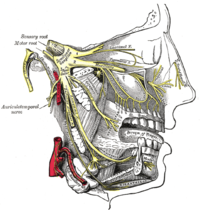
Photo from wikipedia
Abstract Background To investigate whether the addition of injecting 5% dextrose water to the genicular nerves can augment the effect of platelet rich plasma (PRP) injections in treating elderly patients… Click to show full abstract
Abstract Background To investigate whether the addition of injecting 5% dextrose water to the genicular nerves can augment the effect of platelet rich plasma (PRP) injections in treating elderly patients with moderate degree of knee osteoarthritis (OA). Material and Methods Forty-six elderly patients with grade 3 on the Kellgren and Lawrence knee OA grading system were divided into control and genicular nerve block groups. Both groups received 4 milliliters (mL) of PRP injected into the knee joint and 2 mL of PRP to the pes anserinus complex. In the nerve block group, 2 mL of 5% dextrose water was also injected to each genicular nerve. In the control group, normal saline was used to inject the genicular nerves. Proteomic technique of 2-dimensional electrophoresis was used to detect the changes in synovial fluid (SF) protein concentrations. Lequesne Functional Index was used to evaluate knee functional status. Results After 3 monthly PRP injections, concentrations of SF total protein, and proteins associated with inflammation decreased. Protein concentrations associated with chelation increased. In the nerve block group, improvements in pain and in the functional status of the knee joint lasted up to a period of 6 months. At 1 month and 3 months after the injections, Lequesne Functional Index was less than 7 (a value of 7 or higher indicates knee OA). Conclusions The concept of combining 5% dextrose water injection to the genicular nerves, and PRP injection into the knee joint and to the pes anserinus complex can be a feasible non-operative conservative treatment option for elderly patients with knee OA.
Journal Title: Biomedical journal
Year Published: 2020
Link to full text (if available)
Share on Social Media: Sign Up to like & get
recommendations!